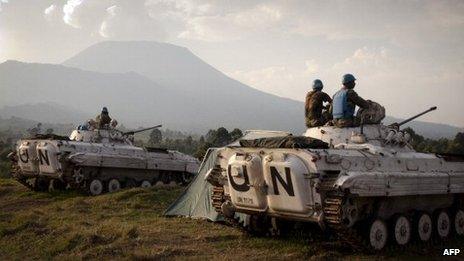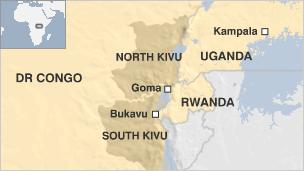DR Congo hails UN attack force
- Published

The UN will now hunt down and "neutralise" rebel groups
The government of the Democratic Republic of Congo has welcomed the UN's decision to create a special force to attack rebel groups along its border with Rwanda.
Spokesman Lambert Mende told the BBC the brigade of at least 2,000 troops would "bring some hope of peace".
This is the first time any UN peacekeeping force has been given such an offensive mandate.
Various armed groups have wreaked havoc in eastern DR Congo for two decades.
The UN has some 20,000 troops in the country - which is two-thirds the size of Western Europe. They have been accused of not doing enough to stop the violence in the mineral-rich region.
The latest rebellion flared up a year ago and has forced some 800,000 people from their homes.
The UN Security Council resolution says the new Intervention Brigade will "carry out targeted offensive operations" to "neutralise" armed groups.
The force will be deployed in July and will include troops from South Africa, Tanzania and Malawi, reports the AFP news agency.
Its mandate will last for one year it will consist of three infantry battalions, one artillery and one special force and reconnaissance company headquartered in Goma under the direct command of the commander of the existing UN mission, known as Monusco, according to the Reuters news agency.
A senior UN source told the BBC that while previous UN operations, even in DR Congo, have been given offensive mandates, the idea of seeking to "neutralise" rebel forces was new.
The source said the rules of engagement would be stronger, and the force better equipped.
The resolution says the decision was taken "on an exceptional basis, and without creating a precedent or any prejudice to the agreed principles of peacekeeping", Reuters reports.
"It's an innovation," said France's UN ambassador Gerard Araud, whose country wrote the resolution.
Other diplomats said the force would help protect women and children from the high levels of sexual violence which have led to DR Congo being called the "rape capital of the world".
There had reportedly been some doubts that such a strong mandate would compromise the force's neutrality.
'Secure the border'
BBC East Africa correspondent Gabriel Gatehouse says the trouble for the UN is that its primary mandate remains the protection of civilians.
Its military operations have in the past been severely restricted by the risk that Congolese villagers or townspeople might get caught in the crossfire, he says.

The resolution was adopted unanimously - meaning Rwanda backed it.
The DR Congo government, supported by UN experts, has accused Rwanda of backing the M23 rebels who took up arms in 2012, although this has always been denied by Kigali.
Mr Mende told the BBC's Newsday programme that the first mission of the new force should be to secure the eastern border - with Rwanda and Uganda.
"We think that every problem we have had there was coming from that border. So to monitor that border - secure it - will really enhance our capacity to deal with the rogue elements within our territory when we are sure that they are not going to receive any assistance from outside."
Earlier this week, one of the men accused of leading the M23, Bosco Ntaganda, made his first appearance at the International Criminal Court in The Hague, after surrendering to the US embassy in the Rwandan capital. He denies 10 charges of crimes against humanity and war crimes.
Gen Ntaganda is an ethnic Tutsi, like the majority of Rwanda's leadership.
Much of the fighting in eastern DR Congo stems from the 1994 genocide in Rwanda.
After being ousted from Kigali, the Hutu extremists fled across the border and some are still based there.
Last month, DR Congo and its neighbours signed an agreement to bring peace to the region.